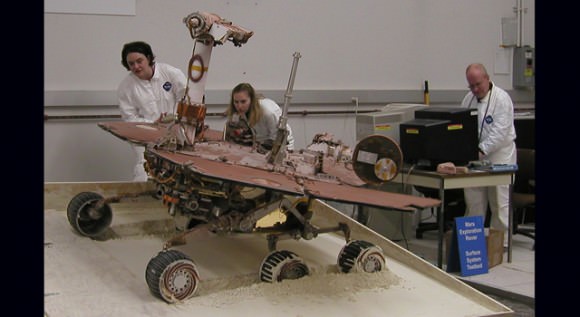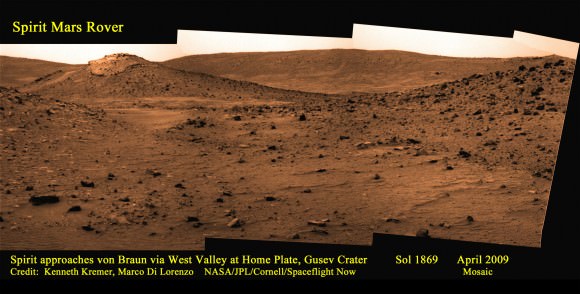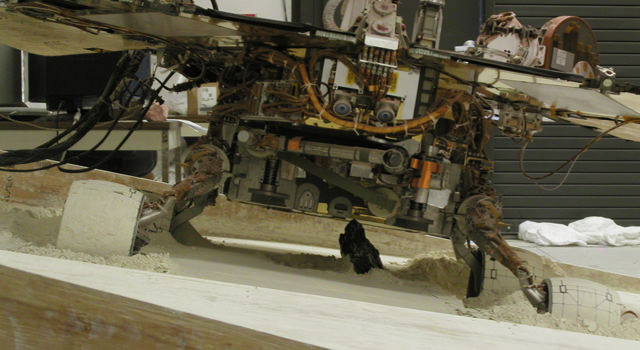[/caption]
Engineers at the Jet Propulsion Laboratory have intentionally driven their engineering rover into soft soil in a sandbox testbed, to simulate how the Spirit rover is stuck on Mars. And they did a good job of it, too, as the test rover, called SSTB1, is stuck, as well, with its wheels spinning and going nowhere. The science team has confirmed a rock on Mars, underneath Spirit is touching the underside of the rover, so engineers have placed a similar looking rock in the test sandbox, as seen above.
“We want to experiment with different extraction techniques down here on Earth before we actually do them for real on Mars,” said John Callas, project manager for the Mars rovers. “Our expectation is that it will some time to get Spirit out, so we will be able to get a better feel for that here in this facility to see how well the techniques work and how long it will take for them to work.”
The rover team spent several days of preparing a sloped area of soft, fine soil to simulate Spirit’s current sandtrap on Mars. On June 30 they maneuvered the test rover around, driving the wheels to the loose soil where the rover would sink and slide to the side, with a slope of about 10 degrees, as engineers believe Spirit has done on Mars.
You can follow the work being done to free Spirit from her predicament at the Free Spirit website. JPL regularly posts updates and videos showing what the rover teams are doing, and currently you can see a movie of how the test rover was driven in the sandbox to get stuck.

There are actually two test vehicles, and the folks at UnmannedSpaceflight.com have a page explaining the differences, as well as other FAQs about the attempts to free Spirit. The one being use for this current test, SSTB1 is a full size replica of the MER vehicles, but it has a few differences such as no solar panels, and a few other minor missing parts. It has the same mass as the ones on Mars, which means it has a higher weight on Earth than the MERs have on Mars.
The other test rover, SSTB Lite, is a stripped down vehicle with same wheel size, actuators and suspension system, but has other major components missing which gives it a weight on Earth that is similar to the weight of MER on Mars. However, when the Opportunity rover was stuck a couple of years in the Purgatory dune, engineers found that SSTB1 behaved more similarly to the MER vehicles, possibly because both the SSTB1 and the soil were subject to the same gravity vector.

So, just where is Spirit on Mars? Take a look at this great image created by Ken Kremer and Marco DeLorenzo of UnmannedSpaceflight.com, showing Spirit’s current location. It shows smooth area in the foreground, that concealed slippery water related sulfate material where rover became stuck. Once free, Spirit will drive to area near the unusually capped hill ahead designated Von Braun to sample water related evidence there. Let’s hope the engineer’s work here on Earth will “Free Spirit” and enable explorations of Von Braun, and beyond.
Caption for mosaic above: Mosaic of the area around Home Plate where Spirit remains stuck was made especially for Spaceflight Now (Used by permission). Credit: Kenneth Kremer, Marco DiLorenzo, NASA/JPL/Cornell/Spaceflight Now. Click the picture for a larger image.
Sources: “Free Spirit” website, Unmanned Spaceflight, Spaceflightnow.com

